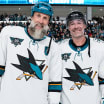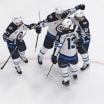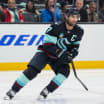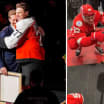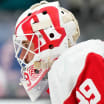Like the 30 other NHL teams, the Winnipeg Jets are playing the waiting game.
Before any team can solidify its plans involving restricted and unrestricted free agents, it must know what the NHL salary cap will be for next season. Jets general manager Kevin Cheveldayoff said he expects that information to be released in the next week, prior to the 2018 NHL Draft in Dallas on June 22-23.
Jets hoping to keep Stastny when free agency opens
GM says Winnipeg needs to know salary cap for next season before finalizing plans
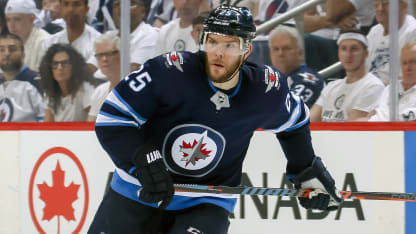
© Jonathan Kozub/Getty Images
Commissioner Gary Bettman said earlier this month that the salary cap for next season is expected to be between $78 million and $82 million. Given the $4 million difference, Cheveldayoff knows the final figure could determine whether the Jets are able to retain the services of a pending unrestricted free agent such as center Paul Stastny, who had 15 points (six goals, nine assists) in 17 Stanley Cup Playoff games for Winnipeg after being acquired from the St. Louis Blues in a trade Feb. 26.
In a wide-ranging interview with NHL.com, Cheveldayoff discussed the prospects of Stastny returning to Winnipeg, the implications of the salary cap, the Jets' plans for the 2018 NHL Draft, the pain that lingers from Winnipeg's loss to the Vegas Golden Knights in the Western Conference Final and how the Jets will handle the increased expectations from within the organization and the hockey-mad city where it operates.
Did Stastny show you enough that there is significant interest on your part if something can be worked out within your cap structure?
"We had some great exit meetings with Paul. He's a special person. The way he came in and made an impact on the ice, people saw it. Off the ice, he's a real pro and our players have really benefited from the two or three months he was with us. But we knew going in that the business side of the game is what it is. Obviously, if he turns out to be just a rental, he'll end up being a very important rental in our process along the way. We didn't get a chance to win the Stanley Cup, but I think our players grew a lot. At the same time, if there is a chance to see if it does fit, both sides are going to try to sharpen their pencils as much as they can, understanding that free agency is right around the corner."
How difficult is it to plan ahead when the final salary cap number hasn't come out yet?
"It's important we find out what it is. Obviously it's a busy time right now. We definitely have a lot of work ahead of us right now with a lot of restricted free agent contracts (goalie Connor Hellebuyck, defensemen Jacob Trouba and Josh Morrissey, and forwards Adam Lowry, Brandon Tanev, Joel Armia and Marko Dano), some with arbitration rights, some without. The timing of things is a little different in those regards. You have some potential UFAs (forwards Stastny, Shawn Matthias and Matt Hendricks, defenseman Toby Enstrom and goalie
Michael Hutchinson
) where you'd like to understand where the potential might be for them moving forward. You can only plan so far in the future until you know exactly what the cap is for the immediate future."
The timing of the final cap amount doesn't give general managers much time before the start of free agency on July 1, does it?
"It's interesting. Obviously for us, when you get through three rounds [of the Stanley Cup Playoffs], you still have to do due diligence on the other stuff like scouting meetings and all those other things that make it business as usual."
What message did you send to your fan base when you acquired Stastny at the NHL Trade Deadline, a perceived aggressive move from a small-market team?
"I think it was great for our city. From our standpoint, you do things that you feel are right and hope the right things fall into place. If we couldn't find the right trade, we weren't going to make one, because we felt comfortable with the makeup of our team moving forward with the group that we had assembled up until the trade deadline. And then when Paul became available, that fit. So there was no hesitation on our side to pay the asset price. As far as our community, I think it was great too, to feel what it's like to have a team that can do that. Again, we talked about the process along the way. There are no guarantees in this game. When you're drafting a player or making a trade or signing a free agent, there are no guarantees. You have to play the game. You have to go through that 82-game grind. You have to earn the right to get to the playoffs. We went through three hard-fought rounds and came up short. But there was a tremendous amount of growth on the ice, off the ice and in the community."
You mentioned the three rounds. Does coming up one series short of reaching the Stanley Cup Final still hurt?
"Can't put it into words. There's a tremendous amount of respect for the two teams (the Golden Knights and Washington Capitals) in the Stanley Cup Final because you know how hard it is to get there and how hard they played to make it there and that they've earned that right to be there. So there's a tremendous amount of respect for them. But I'm real proud of our coaches, our players. We had some real heartfelt meetings with some of our players that were much different than in years past. But there's always going to be a little piece of you that you'll never let go. It's very tough. But that's where the hockey fan in you surfaces. As much as you say you'll stay away, you're drawn to it. You're a hockey fan. You watch the Final. You can't help it. You love the game."
What is your blueprint for the upcoming draft, given that you sent your first-round pick to the Blues in the Stastny trade?
"It's a little different. We don't have a first-round pick, so some of the players you traditionally might be really keyed on, you do more just on the background. You never know if [a] pick is traded."
Expectations from the city, the fan base and even the players themselves have escalated after your playoff run. How are you going to deal with them?
"You set out with the same goal each and every year. What we expect or what we hope or what we predicted or what we prognosticated really doesn't mean anything. You have to understand that you have to earn that right to get there again next year. I can expect the world. But the reality is, our players have to be ready. We as an organization have to be ready. When the puck drops in training camp, we have to put the foundation in place and be ready for an 82-game grind next year."


